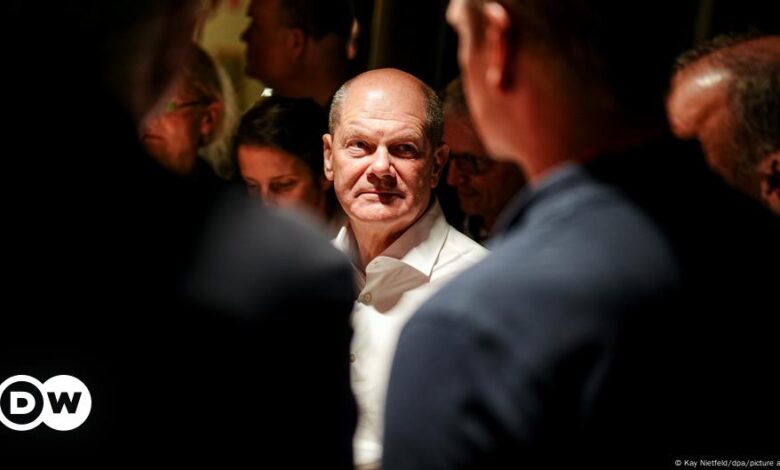German election: Scholz faces confidence vote – DW – 12/16/2024

December 16, 2024
How were the parties polling in December?
Polls show Scholz’s Social Democrats (SPD) behind the conservative opposition Union bloc (CDU/CSU) under Friedrich Merz.
The far-right Alternative for Germany (AfD) is also polling strongly, and is likely to become the second or third largest force in parliament. Its leader, Alice Weidel, is unlikely to win the spot of chancellor as other parties have said they will not enter into coalition with her party.
The business-oriented Free Democrats (FDP) was polling just underneath the 5% threshold required to enter the Bundestag.
Also underneath the threshold was the socialist Left Party, which still hopes to enter parliament by securing at least three direct votes from constituencies even if it is likely to fall far beneath 5% of the total vote.
The left-wing populist Sahra Wagenknecht Alliance (BSW) split off from the Left Party in early 2024 and could enter the Bundestag for the first time in 2025.
https://p.dw.com/p/4oB0Y
December 16, 2024
What is the likely result of the vote?
Scholz’s Social Democrats (SPD) hold 207 seats in the Bundestag and are expected to vote for the chancellor.
The SPD’s junior coalition partner, the environmentalist Greens, has 117 seats and has said it will abstain from the vote.
This means that Scholz is unlikely to secure the 367-seat majority required for him to win.
If Scholz loses, President Frank-Walter Steinmeier will have 21 days to decide whether to dissolve parliament.
https://p.dw.com/p/4oB0L
December 16, 2024
Why did Scholz call the confidence vote in the Bundestag?
German Chancellor Olaf Scholz faces a confidence vote in the German parliament, known as the Bundestag.
He is expected to lose the vote, an outcome which is likely to lead to snap elections on February 23.
The vote comes after Scholz dismissed Finance Minister Christian Lindner of the business-oriented Free Democrats (FDP).
The FDP was the most junior partner in a three-way coalition between it, Scholz’s Social Democrats (SPD) and the Greens.
The collapse of the coalition came after several months of public dispute between the parties on how to manage the federal budget amid a lagging economy, with the FDP insisting on maintaining a debt break.
sdi/lo (AFP, AP, dpa, Reuters)



